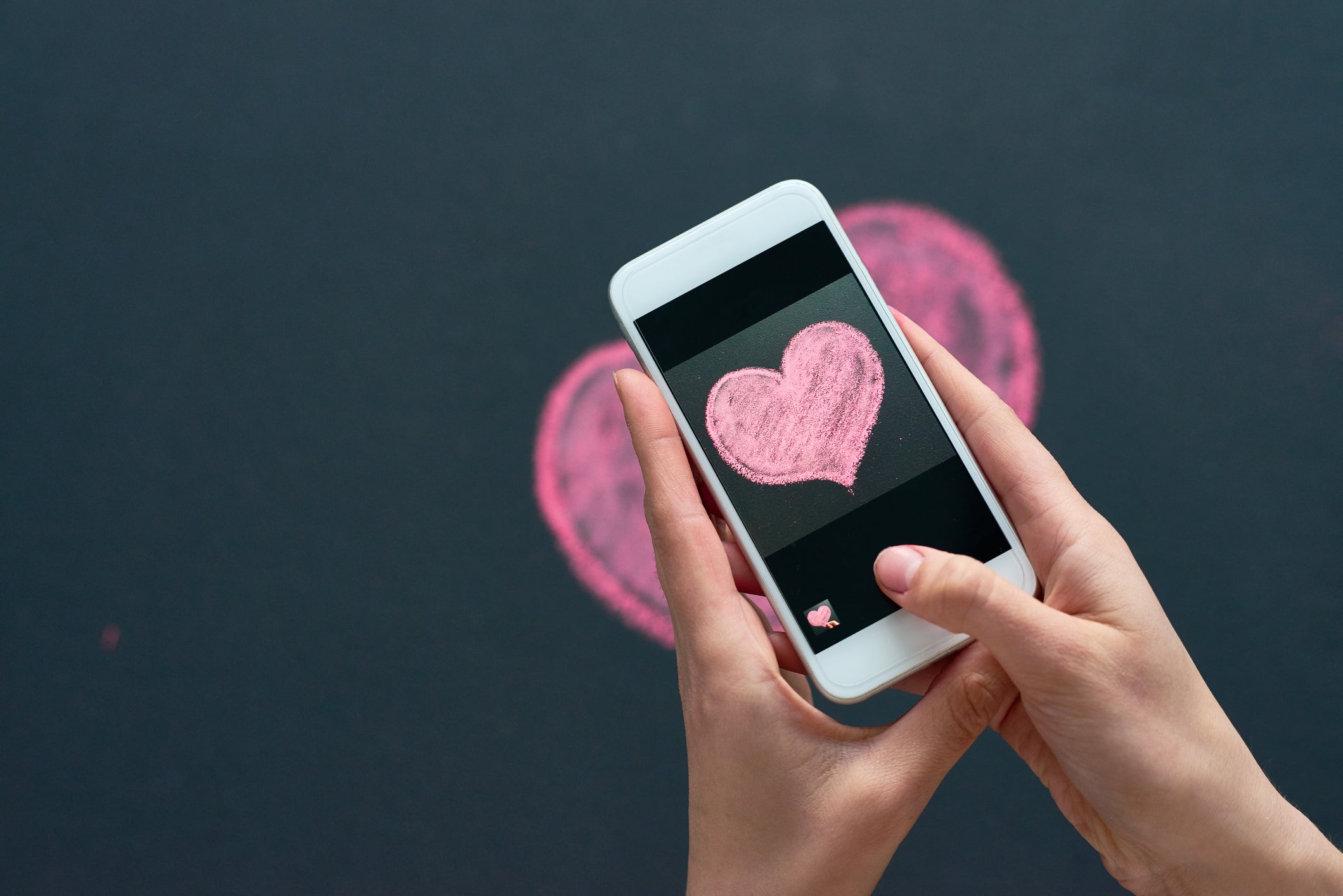Six years ago, PR director Yasmin bumped into a guy named Rory at an art gallery in London, and “chatted him up at the Tracey Emin exhibit”. She took down his number, and they’ve been together ever since. Despite all the time and relationship milestones that have elapsed since then, though, Yasmin still has her partner saved in her phone as “Rory Whitecube”, named in a nod to the place they met. These unconventional contact details, she says, are “definitely part of the lore” of their relationship now. And if you had such a romcom-worthy meet cute with your significant other, wouldn’t you want to preserve it, too?
It might seem like a relatively minor detail, but the way that we store the phone numbers of the people closest to us can shed interesting light upon those bonds – and that’s perhaps especially true of our romantic relationships. Do you, like Yasmin, stick with the original address book entry, knowing it’s part of the tapestry of your shared history? Do you opt for a mushy pet name to signal your adoration, or festoon their name with hearts? Maybe you’re resolutely all business, going for the full name approach, as if they’re someone that you met at a networking event, rather than your wife of 25 years.
When I canvassed my friends about their own approaches, my favourite discovery was learning that one pal has her boyfriend saved under: “Ugh, him again” (she changed his details in retaliation after he put her down as something with a similar, jokily disparaging tone). Entries like this can show us a lot about a couple’s sense of humour, or the contradictory ways that they might prefer to show their affection. “Since the name on our phone is a visual symbol of our partner, and a reminder of our relationship with them, using personal jokes or nicknames can reflect a deeper or more intimate connection,” says Eloise Skinner, a psychotherapist and author.
Twenty-six-year-old Karim, for example, has always had his girlfriend Veronica saved under the name “Ron”, alongside an emoji of a red-headed man. “When we first met, one of the first things we spoke about was nicknames and how people call her Vero or Ronny, so I was like, ‘I’ll just call you Ron to be different,’” he says. “Then I did a Harry Potter joke, which she didn’t get because she’d never watched the movies. So I call her Ron because no one ever calls her that, and the ginger guy emoji is a Harry Potter reference that she doesn’t get.”

Contacts that hark back to a first meeting like this can become part of a couple’s shared mythology: something that’s specifically them, a story that’s not immediately accessible to others. They might not start out as particularly romantic, but they might acquire that significance with time. Forty-one-year-old Saloni met her now-husband when she was 25; for the entire time, she’s had him down in her contacts list as “Carbon”, the name of the nightclub where they first crossed paths. “I did try to change it once to his name, but it felt so weird, so I changed it back,” she says. “It does feel like it’s part of our relationship now, and sentimental to where we met. I won’t change it again now.”
How we save our partner’s details digitally can be at once deeply personal and a little bit performative. “Most of the time, these details are fairly private to us,” explains registered therapist Georgina Sturmer. “This offers us licence to use whichever type of terminology we want – funny, flirty, professional, cold,” (and to throw in as many embarrassing emojis as our heart desires). But, she adds, “increasingly, the names for our contacts are entering the public domain”, thanks to the ways we use technology.
Names flash up on our smartphones in a way that’s far more visible than they ever did on a Nokia 3310. If you’re playing music through your phone or using Google Maps while driving, your incoming calls will be announced for all your passengers to see. If your phone is synced to your laptop, there’s every chance they might crop up when you’re sharing your screen with colleagues on Zoom. So, Sturmer says, “it’s likely that, consciously or subconsciously, we take into account this public element in terms of how we want our relationship to be ‘seen’.” Ring emojis and love hearts, then, might become a way of shouting about the strength of our love.
Others take a more practical approach. “John Husband” is a common format, although I imagine that gets confusing if you’re also friends with someone whose surname is actually Husband. One colleague tells me that his partner of seven years recently took him to task for listing her under her full name, comparing him to Shiv from Succession, a nod to how Sarah Snook’s cutthroat character stored her husband’s number in the same way. Another common option seems to be saving your other half under the acronym “ICE”, or “in case of emergency”.
This might not sound as sweet as a term of endearment or a nod to your backstory, but it might also save any blushes when things go wrong, as communications manager Laura discovered when she fell off her bike and broke her arm. Passers-by rushed to her assistance, “took my phone and asked me who they should call”, she says. But she and her husband had swapped phones so that she could borrow his Apple Music account; in order to reach him, then, they had to call her number. “I wasn’t listed under my name, so I proceeded to list all the names I could be saved under, all while I was in agony on the floor.” She reeled off potentials such as “wifey” and “babe” before suggesting “Snugglef**k” as a last-ditch option, then “heard the chuckles” from the kind strangers who’d got more than they’d bargained for. “Turned out I was in there as ‘My girl’,” she says. “FML.” Or should that be SFML?

Now that online dating is ubiquitous, it’s not uncommon to save the phone numbers of potential love interests alongside the name of the app where you came across them. I reckon that if you were to study a representative group of British millennials and Gen Z, the most common “surnames” in their address book would probably be “Hinge” or “Tinder”, rather than, say, Smith – not least because we’re collectively quite rubbish at clearing out our digital archives. Recent research from Tinder found that 41 per cent of the singles they surveyed were holding on to phone numbers from past matches, even if the relationship failed to launch, with an average of eight exes’ details stored on their phones.
It’s worth noting, though, that many people don’t actually bother properly saving their matches’ numbers at all, instead just leaving them as an impersonal string of digits. When I attempt another deeply informal survey of single friends, many of them confess to doing so because they somehow fear that it might “jinx” their chances. It’s as if we don’t even want to admit to ourselves that we might be hoping for things to pan out well, or as if writing down someone’s name proves that we’ve allocated them an outsize importance. All of which, perhaps, says a lot about the dire state of romance right now.
It might seem a bit irrational, but Sturmer reckons that it is also a defence mechanism. “When we take a measure like this, we are incorporating an element of protection,” she says. “After all, if we have saved someone’s name, then there’s a risk we might need to change or delete it if the relationship doesn’t work out.”
If and when things progress, your match might get promoted from being a member of the Hinge extended family to getting listed under their actual surname. When Olivia, 33, met her new boyfriend, she initially had him saved under that formula of first name plus dating app. Since things have progressed, though, she’s swapped his real name in – but her phone won’t let go of their origin story. “For some reason, when he calls, it comes up on my phone with his full name and then that he works for Hinge,” she says. The app name comes up underneath, “as if it is EE calling or a bank. Makes me laugh every time.”
On a more serious note, though, our contact details might speak volumes about our attachment styles or the way we relate to other people. Those who are classified as “insecure-anxious” are often “preoccupied with seeking reassurance and affection”, Sturmer says, so they might use a “cute nickname or an in-joke” to increase that sense of security. If someone is “insecure-avoidant”, though, they’re likely to be more “dismissive, maintaining distance from those around them”, she explains. “This might encourage someone to keep the names simple, brief and professional. The distance helps protect them from the rejection that they fear might come if they show that they care about someone else.”
It’s human nature to feel a bit put out if you’ve saved your partner under an immaculately thought-out pet name, whereas they’ve got you down under something much more prosaic. “If our partner uses our full name just like they would for any other contact, we might feel they don’t attribute additional value to our communication,” Skinner says, though she cautions that “this may not be true”. It might just be that conventional displays of affection aren’t their style. Or that they’re secure and happy enough in the relationship not to be fazed by small details.
And if things do go wrong? Then it might be time for your partner’s contact details to undergo one final change, swapping them to that universal name of exes everywhere: “Do not pick up.”


